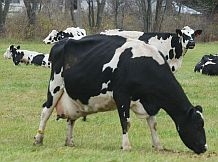 (Host) Congressional negotiators have agreed on a renewal of the farm bill that includes an expanded milk price support program.
(Host) Congressional negotiators have agreed on a renewal of the farm bill that includes an expanded milk price support program.
Supporters say the changes should make Vermont’s small and medium-sized farms more competitive.
VPR’s Ross Sneyd reports.
(Sneyd) Senator Patrick Leahy believes there was more at stake in the negotiations than how competitive Vermont dairy farms are.
(Leahy) “I think if we hadn’t been able to do this, dairy farming would be over as a practical matter in Vermont.”
(Sneyd) Dairy farming has certainly been challenging in New England lately. Just two years ago, farmers got only 12 dollars for every hundred pounds of milk they produced.
Prices are up right now. Farmers are getting around 20 dollars for a hundred pounds of milk.
But their costs have also risen. Fuel prices go up pretty much every day and that drives so much else on the farm, especially fertilizer and feed.
The new farm bill tries to deal with at least some of that inflation through the dairy program known as the Milk Income Loss Contract.
That program guarantees farmers a minimum payment for their milk when prices fall. Under the new bill, the price they’re paid will take the cost of feed into account before that payment is calculated.
(Allbee) “It really does mean a lot to Northeast dairy farmers.”
(Sneyd) Vermont Agriculture Secretary Roger Allbee says that’s because feed prices have doubled in the past three years. Anything that helps get that cost under control will be welcome.
Jackie Folsom of the Vermont Farm Bureau says feed can account for between 30 and 65 percent of a farm’s costs, depending on how much a farmer has to buy and how much he raises himself.
(Folsom) “Certainly when you consider that the feed costs on a dairy farm are a huge piece of the picture of where the income goes, any way that we can make that an evener or a leveler, it will make a tremendous amount of difference.”
(Sneyd) A lot more agriculture policy is covered in the farm bill than just dairy prices.
Leahy says Vermont will also get help to clean up Lake Champlain and the Connecticut River. And, more money will go to food stamps.
The full House and Senate are expected to vote on the bill in the next week or so. But President Bush has raised concerns, so it still faces a possible veto.
For VPR News, I’m Ross Sneyd.